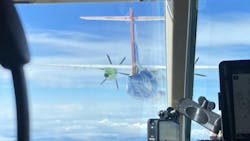German Aerospace Center uses 'flying lab' to measure synthetic fuel emissions from turboprop
MUNICH - In October 2024, the German Aerospace Center (Deutsches Zentrum für Luft- und Raumfahrt; DLR) and the aircraft manufacturer Deutsche Aircraft will conduct the world's first measurement flights in the tailwind of a turboprop aircraft powered by 100 percent synthetic, aromatics-free fuel. From a distance of 50 to 500 meters, the DLR Falcon aircraft will measure the emissions of the D328 UpLift. The aim is to reduce not only the carbon footprint of aviation, but also the particulate emissions and climate-impacting condensation trails – contrails – thus paving the way for climate-compatible aviation. Initial measurements have already taken place at Oberpfaffenhofen Airport, both on the ground and with four research flights all using 100 percent synthetic fuel. Six further research flights are planned between now and the end of October 2024, the German Aerospace Center (DLR) reports. Continue reading original article.
The Military & Aerospace Electronics take:
18 October 2024 - "Sustainable fuels will play an important role in climate-compatible aviation in the future, and in particular electricity-based fuels suitable for large-scale production," explains Markus Fischer, DLR Divisional Board Member for Aeronautics. "That is why I'm particularly pleased that our new D328 UpLift research aircraft is the first in the world to fly with such a synthetic, aromatics-free fuel in its turboprop engines for its research campaign debut. With our Falcon 20E 'flying laboratory', we are contributing DLR's outstanding expertise to the direct measurement of emissions and their resulting contrails directly in flight."
"The CLIM0ART project is another piece in the puzzle of our holistic approach to optimise the environmental impact of our aircraft, with the aim of implementing the latest scientific findings for the climate as quickly as possible in our D328eco aircraft, which is currently under development," says Nico Neumann, Chief Operations Officer at Deutsche Aircraft. "This achievement not only highlights the potential of synthetic fuels, but also the importance of collaboration between industry and research institutions."
Related: DLR perform ground-based emissions tests on synthetic fuel
Related: German-built ESA space probe Hera is ready to take a closer look at near-Earth asteroids
Jamie Whitney, Senior Editor
Military + Aerospace Electronics
